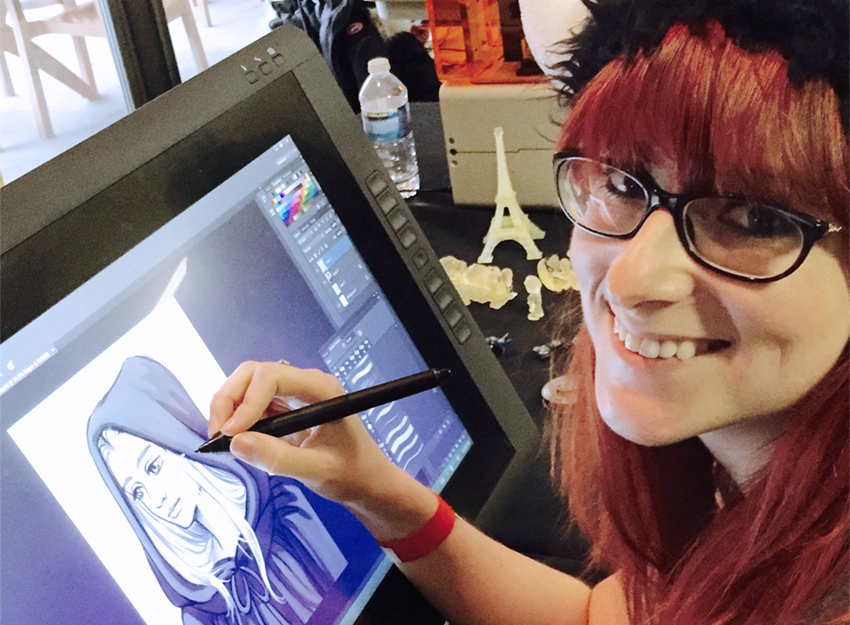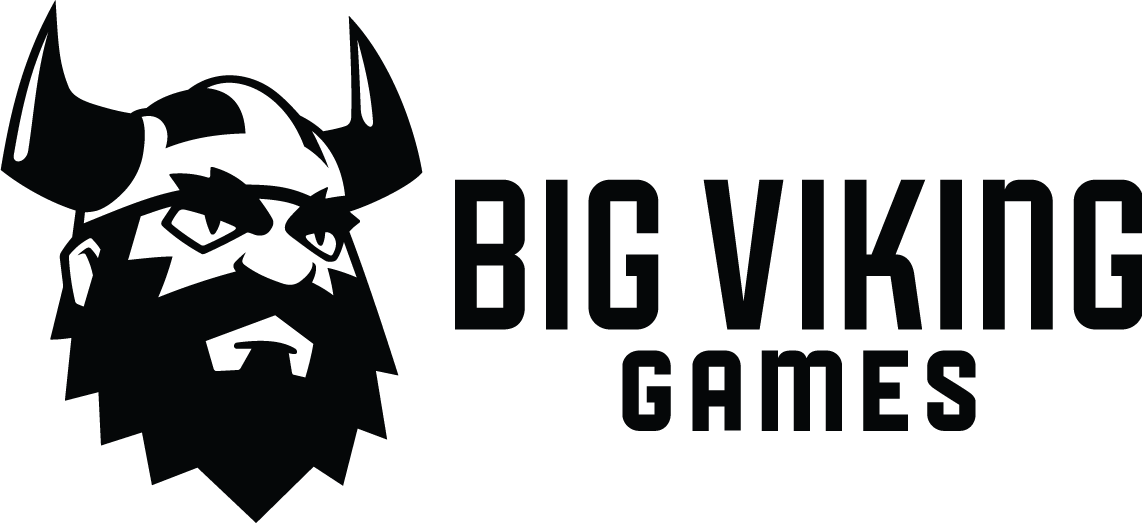
We sat down with three lovely lady Vikings to ask them some questions regarding their experience in the gaming world and in the Viking world. Often times, we’re asked about where all the women are in our industry and why there aren’t more of them, but realistically this particular industry is made up of many talented and inspiring women.
Nora L., Graphic Designer, Vanessa T., Artist/Animator, and Angela O., Illustrator gave their own answers to how they believe women are represented in the gaming world in Canada, read below:
- What made you choose the gaming industry? And how did you first get into gaming as a hobby?
A: My background as an Artist and my love for video games made me think I could definitely make a career of it! I taught myself the technical skills I needed to land the job and then applied at BVG. I had grown up casually playing games like Mario and classic PC games like Commander Keen, but I wouldn’t have considered myself a gamer as a kid. Several years ago, my boyfriend suggested I try Dragon Age: Origins, an epic fantasy RPG with a great story and characters, and I was hooked. I quickly branched out into other games like The Witcher, Half Life, Bioshock, and World of Warcraft. I haven’t stopped gaming since!
N: When I was a kid in the 90’s, I had a really clunky windows ’95 PC and I played lots of crappy point-and-click adventure games, but when I was 9, I saw my uncle playing Tomb Raider II, and I immediately fell in love with the sassy action Heroine. I have been hooked on games and gaming culture ever since, whether it be on PC, console, or tabletop. I always wanted to be a game developer, but my math skills lacked, and I had a knack for art, so I pursued graphic design with the hope that someday I would break into the gaming industry in some way. I was lucky to end up at Big Viking straight out of University.
- Do you believe that there is sexism in the gaming industry? If so, do you have an example?
V: Of course there is sexism, but fortunately at BVG everyone is really inclusive. Apart from the whole Gamergate issue, and just how female gamers and characters are treated in general, it also exists in workplaces. The game industry is widely regarded as a male industry, but women are slowly starting to make their way into it. As women entering such a male-dominated industry, there’s a lot of push back with men feeling threatened, people thinking women aren’t suited for it, or general assumptions that women in the games industry are only secretaries, testers, or on the ops side. When I was in school for video game design, I was really excited to graduate and change the industry just by being in it.
N: As a teenager whose friends were mostly male gamers, I often noticed the way they didn’t treat me equally or see me as a ‘serious’ gamer the way they saw themselves, and it always came with an undertone of “because I’m a girl”. It was true that I didn’t like to play the same games as them, competitive stuff like StarCraft or Call of Duty, but their natural inclination to be somewhat exclusionary of me when it came to gaming made me start to feel like I wasn’t equal. To this day, I have few greater passions than gaming, and I’ve found the community at BVG to be really open, but my past experience has always made me feel like women have to prove something to the gaming community. The number of women in gaming grows to almost half the community now according to annual reports by the ESA, the trend of sexism towards women in gaming is really no longer a niche issue towards a minority group; the community as a whole, from players to developers, should try to grow into a more accepting place for everyone.
- Would you say that women are under-represented in the gaming industry – if so, why?
A: I wish we had more women making games, especially when half of all gamers are women. As a university art student, most of the artists I knew were women, but in the games industry, most of my colleagues are men. I think many talented female artists just don’t realize that good jobs in gaming are out there, and attainable for them. You can teach yourself the technical skills you need to make games. Artistic skills and talent are the most important thing, whether you’re drawing on paper or on a computer.
V: Women are definitely under-represented in games, but so are younger demographics; a lot of the current game developers at the bigger studios have been in the industry for much longer than people my age have been alive. As these great developers start to retire, positions will open up for the younger generation. And as more women enter the industry, younger women are seeing that it’s not only a possible career, but it’s also an exciting one.
- Do you feel that if there were more female game designers that it would change the way women are represented in games?
V: I’m not entirely sold on the idea that more female devs would mean better representation for women in games. There’s a small misconception here that female devs would get a say in design, just by default. Unfortunately, most game design choices are made by publishers or producers who are far more concerned with sales than with representation. Only a few studios can actually pull off being exclusive and not suffering for it (one that comes to mind is Bioware and their LGBT representation in a lot of their games). I think if society itself would change to accept that all people are people, and not defined by gender, then a lot more groups would get represented in games – not just women.
N: In the industry, there are two groups of people involved – the players and the creators. The female segment of players are still being underrepresented by not having the freedom to choose either sex for protagonist characters often enough in games. Whether it’s technical constraints or budgetary ones, there often seems to be an excuse for excluding female characters in so many games – and I mean solid, well-rounded characters, not token, sexed-up tropes. One reason for this may be due to the fact that when it comes to the second segment of the industry – the creators – I believe there is a much bigger gap between the number of female and male creators than there is in the player base, males far outnumbering females. It’s not often you hear about woman in a position of creative power at a game company – Jade Raymond is probably the most well known – and so maybe the lack of female creative vision is causing trouble for the large female player base.
- Why do you think women are reluctant to enter the gaming industry?
V: I think women can be a little reluctant to enter the industry because of all the horror stories they hear. But this is a problem; how can we ever strive to fix the issue if we don’t try to enter the industry and fix things from within? I knew I might face sexism and hardship when I entered the industry, but it was something I really wanted to do, so I did it anyway! Aside from a few bumps on the road, I’ve met a lot of success at BVG and I’ve even grown and blossomed here!
N: Some women may see gaming as “a man’s world”, either from their experiences in gaming, or even just the way the community is represented in our culture. That could easily dissuade them from wanting to work in the industry, especially if they’ve had bad experiences before. That’s why it’s so important to be a part of the solution and not the problem when it comes to the way people treat female gamers. Though it’s hard to lead the charge when your army feels small, if more women were to join the industry and actively participate in shaping its direction, it could change the way the industry operates going forward.
- What is your advice to young women who are looking to enter the gaming industry?
A: As women we tend to be much harder on ourselves than men. Women will refrain from applying for a job if they don’t meet the list of requirements, even though they might be the strongest candidate for the position. It’s easy to undervalue your abilities, but it’s important to have the confidence to put yourself out there and give it a shot. This is a fantastic industry, come join us!
V: If entering the game industry is something you want to pursue, then nothing should hold you back! If, when you get a job, you do face sexism, criticism, maybe even violence—then stand up and say something. Let your coworkers, your company, and the gaming community know it’s not acceptable. You have every right to chase your dreams and take on whatever career you want to. Don’t be afraid, dive in!
N: If you are really passionate about gaming, you can probably find a way to offer something back to the community, and you might find yourself with the dream job you never even knew you wanted. I received education in the field of graphic design, an industry not even directly related to gaming like illustration or animation can be, but I still found a way to be able to turn my skills towards an industry that brings me so much joy.
